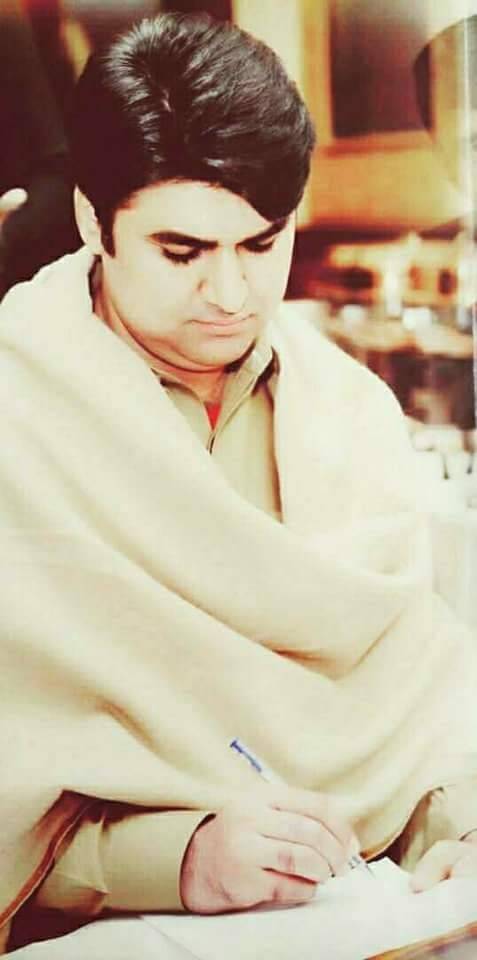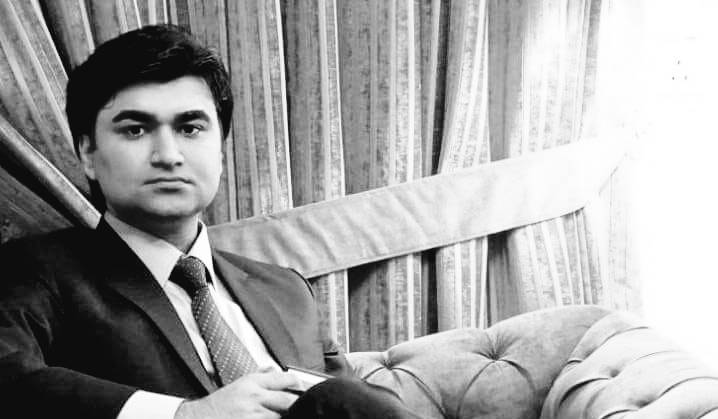Tabassum Zia is a Pakistani writer based in Islamabad. His short stories have been a part of various literary journals of Urdu language such as “Tasteer”, “Fun-Zaad” and “Urdu Afsaana Ehd-e-Haazir Mein”, and his poetry has not only been published in Pakistani magazines but have also made their place in Indian papers. Tabassum Zia’s latest work is his collection of poems titled “Surkh Jan’mon Ke Zard Saaye” published in book form, incorporating free-verse compositions based on hard-hitting realities related to every aspect of life. I asked this poet and short story writer a few questions, which are as follows along with their answers:

When did you discover your talent of writing?
During my school-life, I loved to visit the cinema. Back in those days, only Pakistani movies would be shown, and sometimes, Hollywood films. I internalized the consistency in the themes of those films starring Sultan Rahi and Shan as villains and decided to write a story of a film. So, one day it happened that I took a pen and a pad and started to write a film story despite being unaware of the technicalities of screen-writing. I named my hero as “Tiger”. I was introduced to fiction through my sister who was a university student and would bring home books from her library. One day, her book titled “Manto Kahaniyaan” met my eye. I was in eighth grade then, and uptil now, had been reading moralistic magazines and journals for children such as “Phool”, “Taleem-o-Tarbiat” and “Humdard”. When I came across this voluminous book on the cover of which a man in spectacles (Manto) would keep staring at me, I read a story from it and by the time I reached 9th grade, I had read all of Saadat Hassan Manto. From then onwards, I would write stories and keep them safe with me. However, the idea of getting my stories published never hit my mind because I did not belong to a literary family. It was in 2013 that I sent a children’s story to “Akhbaar-e-Jahaan” and it got selected. The publishing of writings has continued since then.
You write short stories. Your book of poetry has been recently published and you are also planning to write a drama. Which genre do you like the most and think that you are best at?
As I told earlier, I started off with script-writing. Then I went for short stories. I also penned down some incoherent verses in my diary while I was in school, which was not poetry in the true sense of the word, but only a result of first love. It was during a specific span of time that I created poetry in the real sense, the product being “Surkh Jan’mon Ke Zard Saaye”. The poems which this book of mine incorporates cannot be considered as the illegitimate off-springs of my unrequited love. The collection is but one of the waves of the whirlpool of social ills and bitter experiences that engulfed in me in such a way that I could not find a way out. When the published work went into the hands of sensitive readers, it resulted in bringing tears in their eyes. Where parents give equal care and attention to all of their children, they do secretly love one of them more than the others. Therefore, I love short story the most. I am very sensitive about this genre and therefore, come up with few but carefully crafted pieces of it. I am also writing a drama. It is for the publisher and the coming days to decide which genre I am best at and which becomes my identity. Right now, I do not think I have contributed much.
Can you share with us some technicalities of free verse about which only a poet knows and not a layman?
Poetry is considered as the best genre of Literature. Both reading and writing poetry is highly regarded. The whole world is a simulation of poetic creation. Everything is related to each other and every object moves in its own rhythm. Poets who use free verse possess symbols and similes of which a layman cannot even think of. A poet keenly observes all that is going around him/her and his/her feelings and intake of experiences are entirely different from those of common people. When a poet lets these experiences out, they do not come as merely a collection of words assembled together on a piece of paper. Whatever the poet has experienced touches his or her soul while finding its way out and therefore, acquires a certain rhythm. Poetry is not something to be learned. It is all about intuition. However, a poet does gradually start to understand the technicalities of poetic creation. Imposing verses on one’s own self does not result in intuition but only forced writings which do not have the power to keep the reader hooked.
You claim that you do not write romantic poetry. Is there some specific reason behind it?
The reason why I cannot come up with romantic poetry is because romantic poetry is not possible in the modern times, for we are surrounded with grief. After experiencing and observing painful realities, there remains no margin and no stimulus for the creation of romantic poetry. If I and my poetry are dry or harsh, they must be analysed in the light of the circumstances we are living in.

How difficult is it being a poet in Pakistan?
This is an interesting question, the answer to which is also interesting. There is nothing bad about being a poet. However, being a poet and a poet only is cruelty perpetrated on one’s own self. Being a poet is healthy for the society but contagious for a poet himself or herself. Life becomes extremely difficult for those who decide to remain poets only, for poetry does not provide them with food for survival. There were even times when being a poet was associated with failure, insanity and a miserable condition.
People possessing artistic or poetic temperaments have unusual experiences and they never forget a lot of things from the past. Tell us something about your childhood.
I believe that every person’s childhood is good. Even a child involved in labour does not over-think but gets engrossed in playful activities on arriving home. Even now when I contemplate my childhood, I feel a heartache. It requires a lot of courage to go through my childhood albums for me and even if I manage to do so, I am not able to refrain myself from weeping. However, every human being alive has to pass through these stages. What I remember from my childhood is that I was never into outdoor games. My father did try to arrange a basketball instructor for me and also strived to inculcate in me an interest in squash or badminton but all in vain. Personally, I liked weight-lifting but I did not continue that even. Most of my time was spent watching drama serials and reading stories. I would also keep exploring new things. There was a cupboard which I had turned into a laboratory and whenever I would open it, I would start imagining myself as a scientist. In the same cupboard I had pasted over a hundred pictures of Zeba Bakhtiar, for I had fallen in love with her at that point in time. I somehow managed to attain her address and while on a trip to Islamabad, planned to visit her. The taxi was hired. My father was with me to whom I had lied that I have to meet a friend. However, when I reached, I could not develop the courage to enter and therefore, retreated. All of this started after her film, “Sargam” and continued for a long time. It is only these memories of longings which enrichen my childhood. They remained longings, but their association with my childhood memories is such that I feel as if I attained every love of mine.
How has the response been towards your recently published book, “Surkh Jan’mon Ke Zard Saaye”?
I had heard that we are not fond of reading as a nation. This turned out to be false when my book got published. After the book got published, the responsibility of distributing it also came into my hands. This was difficult, but thanks to the social media that 80 % of the printed copies got sold and majority of the buyers were those people who knew me only through Facebook.
What are your future plans related to writing?
I am currently writing a drama and also wish to write a film. It is only if I am able to do something different that I will bring it to the front, otherwise I might burn it to ashes. I write short stories and will keep penning them down till my last breath. I have planned to get a collection of short stories published soon, but then the word “soon” stretches across years in my case.







